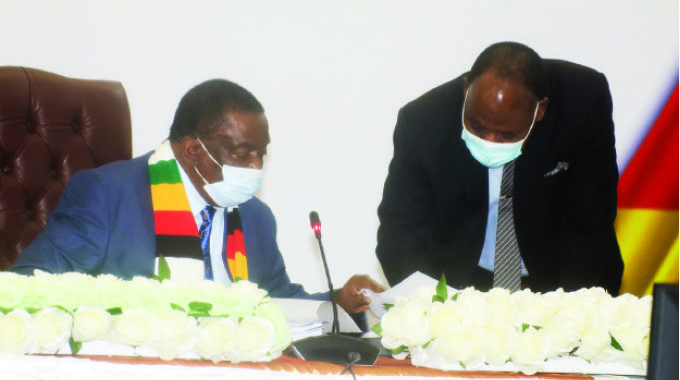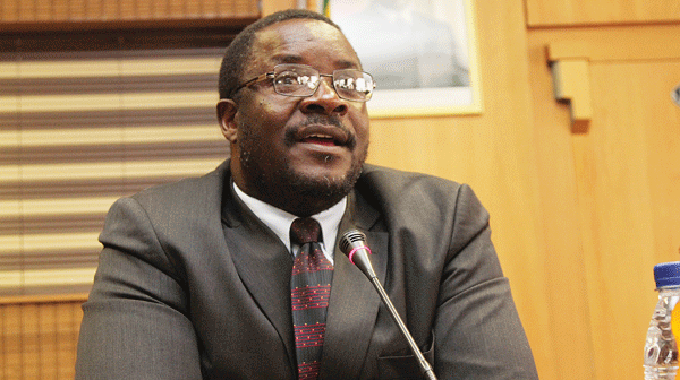Cut unnecessary foreign trips, ministers told

Farirai Machivenyika-Senior Reporter
President Mnangagwa yesterday warned Cabinet ministers to desist from embarking on unnecessary foreign travel and instead focus on developmental programmes in line with Vision 2030.
He said this unbecoming culture of unwarranted foreign trips by Cabinet ministers must stop immediately.
“I have observed a worrisome trend (of) ministers, you are now prone to foreign travel, along with your senior officials. This unbecoming culture should stop forthwith,” President Mnangagwa said in his opening remarks at the 2022 first Cabinet meeting held at State House.
The President said the signing of performance-based contracts by Cabinet ministers last week should be an inspiration for working harder to ensure the success of Government programmes.
He said 2022 marked the fourth year since the advent of the Second Republic, during which the nation has experienced some bitter-sweet moments with many successes being scored in the quest to improve the plight of the people.
“Against the backdrop of the signing of performance contracts last week; let us increase our work rate towards being a more successful Government,” President Mnangagwa said.
“Individually and collectively, we have a sacred obligation to press on for more and better results. Patriotism and loyalty to our National Vision; unflinching commitment and dedication to serving the people of our country; thoroughness in the execution of tasks, among other attributes is what will propel high impact results.”
President Mnangagwa said the need for the Government to attain all set targets cannot be over emphasised and should be spurred by heightened attention to detail and implementation of strategies as captured in the performance contracts.
“The quarterly reports under NDS1 (National Development Strategy 1) will form a critical part of an agenda to ensure that we track our progress in that regard . . . It is my firm belief that, coupled with the continuous improvement in the conditions of service for our staff; Vision 2030 is attainable,” he said.
Vision 2030 is aimed at delivering a planned upper middle income economy.
The President said Cabinet’s workflow should be more predictable so that the Government focuses more on the implementation of policies and programmes and said that proposals should be submitted in time to enable Cabinet to deliberate on the matters more robustly.
He called for unity of purpose within Cabinet saying it was only as strong as its weakest link.
Turning to prospects for the year, the President said the summer cropping season was good despite the dry spell experienced earlier in the season.
“The economy has been projected to grow by around 7,4 percent this year, driven mainly by the buoyant performance of the mines and minerals sector,” he said.
“This comes against the backdrop of an expected rebound of the global economy, as recovery from the Covid-19 pandemic continues. On our part, we are fully geared to curtail the negative impacts of the scourge.
“The country’s vaccine stocks are sufficient to achieve herd immunity. Our message to the people remains focused on vaccination as the first line of defence, given the mutating nature of the virus.”
President Mnangagwa expressed the hope that Cabinet would develop and implement more innovative and multi-pronged strategies to drive economic growth towards the achievement of the targets outlined in NDS1 and beyond.
He said climate change had resulted in the country experiencing floods that have damaged both rural and urban settlements leaving a number of households in dire need for alternative accommodation.
On electricity supply, the President said there was need to increase generation capacity in the country through issuance of licences to more independent power producers.
“The challenges currently affecting the Southern African Power Pool require innovative solutions.
“Regional co-operation agreements on energy and power supply and management require urgent operationalisation,” President Mnangagwa said.
He challenged relevant line ministries to reduce the red-tape on the matter.
“Ministers and officials must always be guided by national interest,” he said.
He directed ministries to prepare progress updates on the respective regional co-operation agreements presented at the last Cabinet meeting in 2021 and table them for consideration by Cabinet during the first quarter of 2022.
“International co-operation agreements will also require attention as we take our engagement and re-engagement programme to new levels.
“Our Foreign Missions are expected to work tirelessly to advance our economic diplomacy, including through the identification of niche markets for our diverse range of exports,” he said.
The ongoing Expo 2020 Dubai continued to yield pleasing results, he said, and challenged ministries to identify aspects that relate to their specific ministries towards the consolidation of viable investment proposals once the progress report on the Expo has been received.
“In this regard, the role of the Zimbabwe Investment and Development Agency cannot be over-emphasised. In our clusters, let us all strive to remove impediments to the ease of doing business,” President Mnangagwa said.
He added that it was the second year since the operationalisation of the African Continental Free Trade Area (ACfTA) and the country opened up its economy to the free movement of goods and services.
“The implementation of the critical, high-impact programmes and projects under the 100-Day Cycles, entails that we keep the upliftment of the quality of livelihoods of our people, top priority.
“The infrastructural projects should enhance the provision of critical economic enablers, while at the same time creating jobs that improve the welfare of citizens and their contribution to the Gross Domestic Product,” he said.
He added that a substantial resource envelop had been availed for the Devolution and Decentralisation Programme in the 2022 National Budget and visible transformation across the respective provinces was an imperative.
The Office of the Minister of State for Provincial Affairs and Devolution has since been strengthened.
“The thrust is to ensure that the focus of planning and managing implementation of development progressively shifts to provinces and the community levels.
“For consistency and greater synergies, Ministers of State for Provincial Affairs and Devolution will be co-opted into some Cabinet Committees,” President Mnangagwa said.








Comments